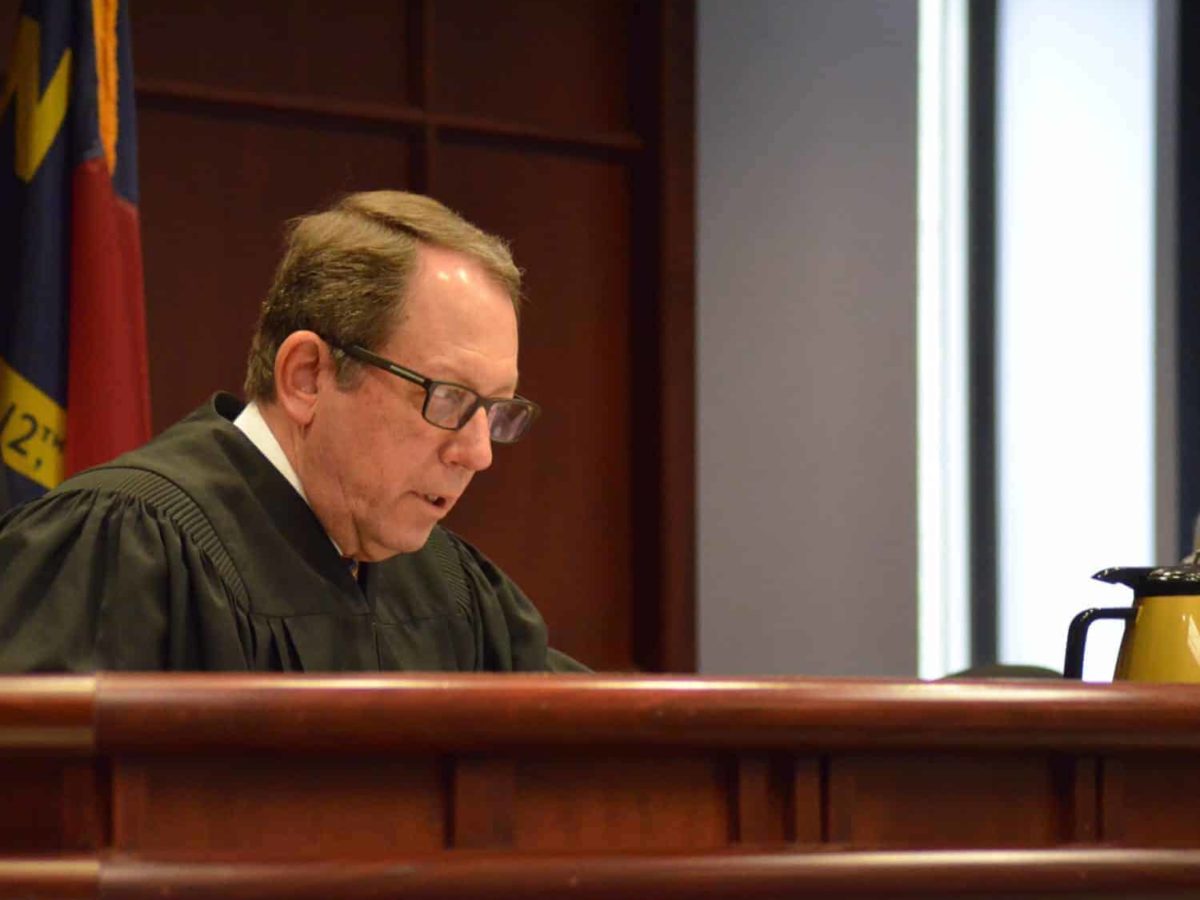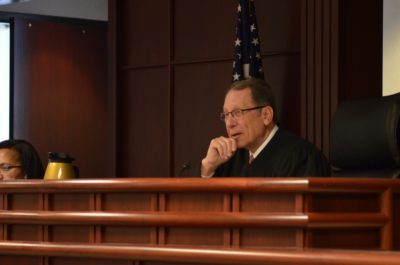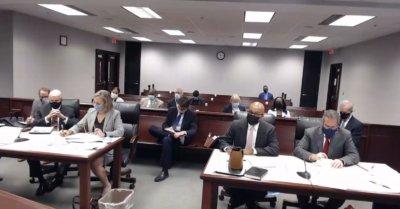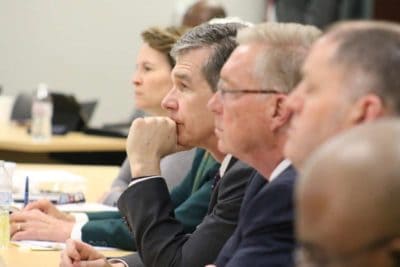

Updated at 10:23 a.m., Tuesday, Nov. 9, with the Attorney General’s response to the plaintiffs’ draft order.
Updated at 9:23 a.m., Tuesday, Nov. 9, with a comment from former Supreme Court Justice Robert Orr.
Updated at 7:42 a.m., Tuesday, Nov. 9, with the State Board of Education’s response to the plaintiffs’ draft order.
A hearing is set in the long-running Leandro case for Wednesday. And since whatever the judge orders could impact ongoing budget negotiations, the stakes are high for students and educators, schools and districts.
So high that state Superintendent Catherine Truitt sent a letter to lawmakers and Gov. Roy Cooper on Monday.
“While I understand that negotiations continue to play out, I want to make it clear that the Department of Public Instruction – and NC’s K-12 education system at large – is facing considerable obstacles while we wait in limbo,” she wrote. “If a budget is not signed, hardship will be experienced, yet again, across our state with severe implications for our students, our teachers, and our school support staff.” The full letter is embedded below.
Judge David Lee gave the parties in the case until Nov. 8 to tell him how they wanted him to order lawmakers to fund the next two years of a comprehensive plan to ensure that the state is giving all students access to a sound basic education as required by the state constitution.
Last week, the plaintiffs sent in their response, asking Lee to order $1.7 billion appropriated for the plan. The draft order includes a 30-day stay of the order to “permit the other branches of government to take further action consistent with the findings and conclusions of this Order and/or to permit any Party to seek appellate review of its terms.”
The defendants in the case responded on Monday. Here is the State Board of Education’s response, which doesn’t ask Lee for anything substantively different. Here is the State Attorney General’s response, which says that the state has enough unspent funds to pay for the next two years of the comprehensive plan and addresses separation of powers.
The Leandro case started in 1994 when families from five low-wealth counties sued the state, claiming North Carolina was not providing their students with the same educational opportunities as students in higher-income districts. The plaintiffs and defendants in the case are on the same page with wanting lawmakers to fund the comprehensive plan. Lawmakers aren’t a party to the case.
For a full history of the case, go here.
The judge
For decades, the Leandro case was overseen by Judge Howard Manning. In October of 2016, he requested to be removed from the case and Chief Justice Mark Martin reassigned it to Emergency Superior Court Judge David Lee. Lee ordered a consultant to make recommendations in the case, and then pushed forward with a comprehensive plan agreed to by both plaintiffs and defendants to address the state’s shortcomings in public education.
Back in April of this year, Lee said that he had no intention of telling lawmakers how much money they needed to spend. He said, rather, that he wanted buy-in from them to address the needs laid out in a comprehensive plan.
“I want this to be a cooperative effort with everyone having the same goal in mind,” he said. “I don’t know why you would not have that goal in mind, which is to educate these children and give them a sound basic education so that everyone will have a better tomorrow.”
But his tune changed as lawmakers rolled out budget plans that only funded a fraction of the next two years of the comprehensive plan, and then as negotiations between lawmakers and Gov. Cooper dragged on.
Teachers have had no real pay raises since 2018, and the state has been operating since July 2019 on a continuation budget amended by some mini-budgets passed by lawmakers. Right now, the state is sitting on more than $8.6 billion as of September that can’t be allocated until there is a budget.
In September, Lee criticized the Senate and House budget plans, and said he was getting tired of waiting on lawmakers to do the right thing.
“I don’t want to give up on our public officials just yet,” he said. “I’m very close to it, I’ll tell you that.”
In October, he was done waiting.
“I think everyone knows I’m ready to pull out of the station and see what is around the next bend,” he said, adding later, “I’m not going to beat myself up further about our state adopting a budget … I’ve dealt with that … as long as I think I reasonably can.”
Lee has also addressed arguments by some that Republican lawmakers weren’t consulted before a comprehensive plan was developed in the case. He pointed out in October a state law created by the General Assembly in 2017 that would have allowed lawmakers to participate.
“Any action in any North Carolina State court in which the validity or constitutionality of an act of the General Assembly or a provision of the North Carolina Constitution is challenged, the General Assembly, jointly through the Speaker of the House of Representatives and the President Pro Tempore of the Senate, constitutes the legislative branch of the State of North Carolina and the Governor constitutes the executive branch of the State of North Carolina, and when the State of North Carolina is named as a defendant in such cases, both the General Assembly and the Governor constitute the State of North Carolina,” the law states.
With the budget long overdue and frustrations mounting on all sides, it seems unlikely that Lee is going to wait any longer. So, what happens if Lee does what the parties want and orders money appropriated for the plan?
The process
In the draft order created by plaintiffs and sent to Lee last week, plaintiffs are asking Lee to order the state budget director, controller, and treasurer to transfer from the unappropriated balance in the General Fund more than $1.5 billion to the state Department of Public Instruction, $189.8 million to the Department of Health and Human Services, and $41.3 million to the University of North Carolina System.
There is a reason those three specific people and their organizations are named. The process that would ultimately end in the appropriation of that money must go through each of them, according to multiple sources.
The Office of State Budget and Management (OSBM) authorizes appropriations. Charlie Perusse is the state budget director who would make the decision whether to authorize the appropriation as ordered by the court. Perusse is appointed by Cooper, a Democrat.
Dr. Linda Combs is the state controller. Appointed by former Gov. Pat McCrory, a Republican, and confirmed by the legislature for a 7-year term in 2014, Combs serves as an “independent resource to protect the financial integrity of the State.” She would decide whether to ask the treasury to transfer the money for the appropriation.
The treasurer operates as the bank, transferring the funds unless they determine there is a reason not to, like fraud. Dale Folwell, an elected Republican, is serving as treasurer.
The auditor serves as a final check on the system and could relieve other state officers of their responsibilities under the state’s cash management statute. Democrat Beth Wood is the elected state auditor.
The question is: If Lee does order the money appropriated, what will each of these individuals do as the order moves down the line?
Gov. Easley’s precedent
In the mid-2000s, Democratic Gov. Mike Easley bypassed the state legislature to fund education items he thought were necessary, and he did so under the auspices of the Leandro lawsuit.
Back in October, The Assembly wrote the following in an article about Leandro:
“In 2002, Democratic Gov. Mike Easley, facing the start of the school year with no state budget, ordered the state to spend $54 million to reduce class sizes and expand his signature pre-kindergarten program, More at Four. In 2005, he ordered the budget office to free up $75 million for low-wealth public school districts, at-risk students, and other educational needs.
“In each instance he cited the ongoing Leandro case. ‘The school funding lawsuit, known as Leandro,’ Easley wrote in a 2002 executive order, ‘has now reached a crisis point.'”
The article notes that some people are saying that Cooper should do something similar now.
In an interview with EducationNC, Easley said it could be more difficult for Cooper to make a similar move.
“I had a very specific program that needed to be funded on constitutional grounds, much like what you’ve got here, except my executive order was limited to one program,” he said, referring to More at Four. He added later: “There’s all kind of ways I can think of that it makes it more complicated for Governor Cooper and the legislature with a package as large as this.”
For one thing, changes in state statute may complicate matters.
This section of state statute — § 143C-6-4. Budget Adjustments Authorized — makes allowances for budget expenditures outside of those ordered by lawmakers: “The General Assembly recognizes that even the most thorough budget deliberations may be affected by unforeseeable events; therefore, under the limited circumstances set forth in this section, the Director is authorized to adjust the enacted budget by making transfers among lines of expenditure, purposes, or programs or by increasing expenditures funded by departmental receipts.”
It goes on to list some of the reasons that “a State agency may, with approval of the Director of the Budget, spend more than was appropriated in the certified budget by adjusting the authorized budget.” One of those reasons is if it is: “Required by a court or Industrial Commission order.”
But, something has been added to this section of state statute that is new since Easley’s day: “Subsection (b) of this section shall not be construed to authorize budget adjustments that cause General Fund expenditures, excluding expenditures from General Fund receipts, to exceed General Fund appropriations for a department.”
Legal precedent on separation of powers
Many cases may end up being important in the appellate review of the judge’s decision and what ends up happening as a result, including this case cited in a press release from Senate Republicans. In it, the Richmond County school board sued the state over fees collected for criminal offenses. The fees were used to fund a county jail program while the board said it should have gone to schools.
The school board ultimately won, and the court ordered the money be paid back to the county’s schools.
But that never happened because the money had already been spent on the county jail program. The school board went back to court and got an order to force the state to pay them out of the state treasury.
Ultimately, though, the North Carolina Court of Appeals said that the court went beyond its power in ordering the state to pay out of treasury. The Court of Appeals said the role of the courts ended when the court ordered the money paid back.
“As the Framers of our constitution intended, the judiciary ‘performed its function to the limit of its constitutional powers’ by entering a judgment against the State and in favor of the Richmond County Board of Education,” the decision in the case states.
It goes on to say that it was then up to the legislative and executive branches to work things out. And if they didn’t, the recourse for citizens was to vote them out of office if they so chose.
“The State must honor that judgment. But it is now up to the legislative and executive branches, in the discharge of their constitutional duties, to do so. The Separation of Powers Clause prevents the courts from stepping into the shoes of the other branches of government and assuming their constitutional duties. We have pronounced our judgment. If the other branches of government still ignore it, the remedy lies not with the courts, but at the ballot box,” the decision states.
In addition, the Court of Appeals stated that “[a]ppropriating money from the State treasury is a power vested exclusively in the legislative branch” and that the judicial branch lacked the authority to “order State officials to draw money from the State treasury.”
The ruling also explains why separation of powers is so important when it comes to disputes between the judicial branches and others:
“Although most Separation of Powers cases (in modern times, at least) involve clashes between the legislative and executive branches, in many ways the judicial branch poses the greatest risk to the doctrine. This is so because the courts have an inherent power ‘to do all things that are reasonably necessary for the proper administration of justice.’ In re Alamance Cty. Court Facilities, 329 N.C. 84, 94, 405 S.E.2d 125, 129 (1991). To accomplish this task, courts possess the power to issue injunctions and extraordinary writs, like the writ of mandamus issued in this case. If the public officials targeted by these injunctions and writs ignore them, those officials can be held in contempt and put in jail. Left unchecked, this power would permit judges to freely organize and execute State power as they see fit,” the ruling states.
The press release from Senate Republicans also references the case of Cooper v. Berger, including the following: “[t]he power of the purse is the exclusive prerogative of the General Assembly.”
The press release also references Article V, Section 7 of the North Carolina Constitution: “No money shall be drawn from the State treasury but in consequence of appropriations made by law, and an accurate account of the receipts and expenditures of State funds shall be published annually.”
But Melanie Dubis, an attorney for the plaintiffs in the Leandro case, has said it doesn’t apply here. “There is a remedy available here. There is a remedy that is grounded in the state constitution, in the state constitutional authority granted to the court,” Dubis said. “There is not a separation of powers issue at play here.” She went on to say: “Anyone who argues … that the court does not have the authority is arguing that our state constitution is not worth the paper it’s printed on.”
She also said at the October hearing that 17 years, 2 months, and 18 days had passed since the state Supreme Court ordered the state to remedy its violation of the constitutional right of access to a sound basic education for all children. She said the court had given the legislative and executive branches long enough to act.
The state Attorney General’s response to the plaintiffs’ draft motion addresses separation of powers, distinguishing prior case law and arguing, “The General Assembly’s ongoing failure to heed that constitutional command leaves it to this Court to give force to it. The Court can do that by recognizing that the constitutional mandate of Article I, § 15 is, itself, an appropriation made by law.”
In an opinion piece published by WRAL yesterday, Burley Mitchell, former chief justice of the North Carolina Supreme Court and author of Leandro I, and Henry P. Van Hoy II, former president of the N.C. Bar Association, said that the response to the Leandro case from lawmakers such as Senate President Pro Tempore Phil Berger, R-Rockingham, is putting the state at risk.
They referenced quotes from Berger where he called Lee “unhinged,” and said he is making “a mockery of our constitutional order.”
“Sen. Berger’s statement takes a wrecking ball to separation of powers and demeans Lee,” Mitchell and Van Hoy write.
They go on to say that the state’s constitution gives the judiciary the duty to decided whether an act by the other two branches of government violates the constitution. They say the judiciary is “accountable to the rule of law and not to the legislative or executive branches.”
“Once the judiciary has established the rule of law for the case, the legislative and executive branches of government hold the companion duty to assure the rule of law is fully implemented. This principle is fundamental to our democracy,” they write.
“That legislators believe they can ignore constitutional obligations without check by the courts should profoundly disturb all citizens,” they continued. “That some legislators demeaned a judge acting in accordance with law, thereby undermining judicial independence and authority, is equally disturbing.”
Another justice weighs in on the scope of the remedy
Bob Orr, the former state Supreme Court justice who wrote the opinion in Leandro II, said in an email that the “big question” in Leandro right now is whether the case is about at-risk kids or the entire public education system in North Carolina.
“It seems to me, a remedial order focused on at risk kids is clearly appropriate,” he wrote in the email. “A remedial order applying to the system is more problematical based on Leandro II.”
He went on to excerpt this portion of the opinion from the Leandro II decision:
“After so concluding, the trial court then went on to describe its next two missions: (1) to determine whether the State’s Education Delivery System is providing the means for Hoke County’s students to avail themselves of an opportunity to obtain a sound basic education; and (2) to determine whether the State’s Education Delivery System is providing the means for ‘at-risk’ children to avail themselves of an opportunity to obtain a sound basic education. However, at some juncture in the proceedings, it appears that the trial court combined these two discrete inquiries into a single entity–namely, whether the ‘at-risk’ children of Hoke County are being denied the opportunity to obtain a sound basic education.”
While the State Board of Education — a named defendant in Leandro — is in general agreement with the plaintiffs about moving forward with the comprehensive plan, their response to the plaintiff’s draft motion from last week indicates that they may share some areas of agreement with Orr.
They responded to a line in the plaintiff’s draft order which stated that “more than an entire generation of children have been denied a fundamental constitutional right.”
The State Board suggests revising that line to instead say that “too many children have been denied their” rights. They explain their rationale as follows:
“It is inaccurate to say ‘an entire generation of children’ have been deprived of their constitutional rights. The North Carolina public school system is not uniformily deficient. In fact, the great majority of North Carolina students have received and continue to receive the opportunity for more than a sound basic education. It goes without saying, the SBE does not tolerate even one child being deprived of their right to education, but, in the context of this case, ‘too many’ seems to be the required finding to support the systemic remedies the Court is proposing.”
The Leandro hearing is Wednesday at 2 p.m. You can find all the information you need to attend virtually here. EdNC will also be live tweeting the hearing.
Additional information:
Senate Democrats announced Monday that they would hold a virtual press conference with education advocates Tuesday at 9 a.m. in advance of Wednesday’s hearing to call for full funding of Leandro.
Here is Truitt’s letter:




